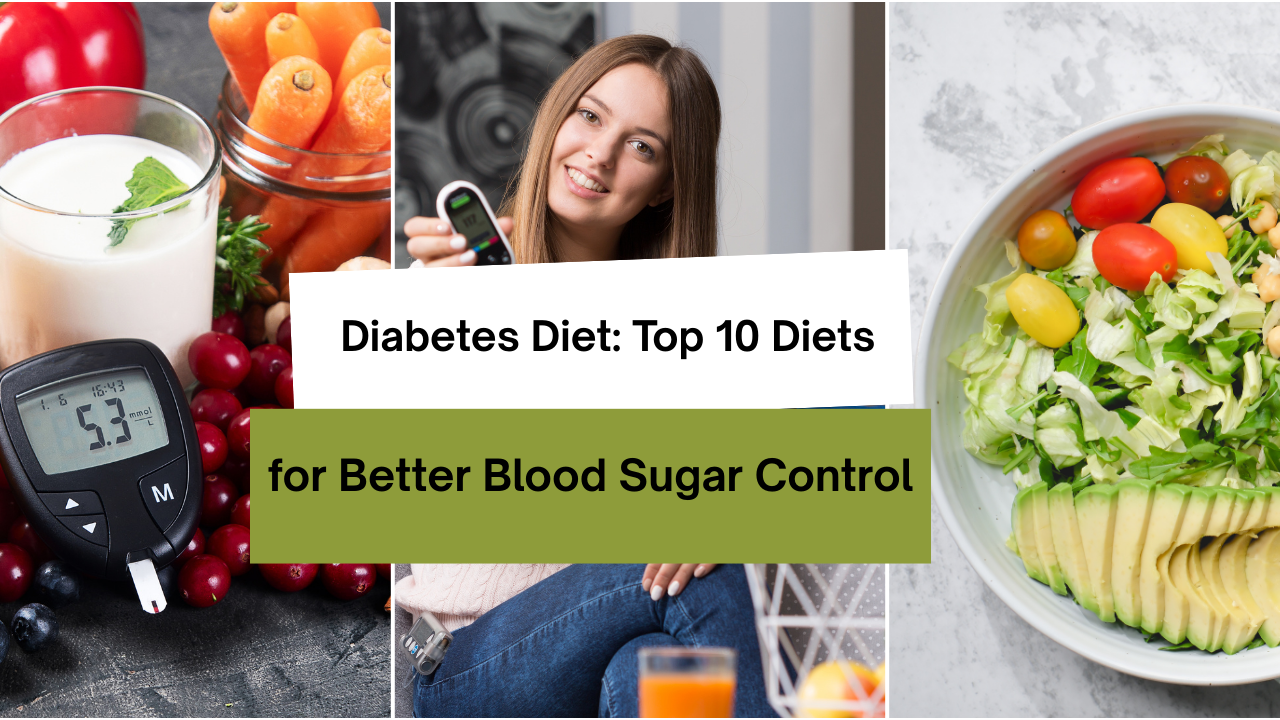Coffee is one of the most popular drinks around the world, known for its energizing effects and pleasant aroma. Many people start their day with a cup of coffee to boost focus and energy. However, not everyone reacts well to caffeine or enjoys the strong taste of coffee.
For those with caffeine sensitivity, digestive issues, or who simply want to try something new, healthy coffee alternatives offer great options. These drinks can provide energy and focus without the side effects of traditional coffee. They often include ingredients like herbs, mushrooms, or grains that support overall wellness.
As interest in wellness grows, the demand for healthy coffee alternatives continues to rise. From herbal teas and chicory blends to mushroom coffees and matcha, these options offer a nutritious and refreshing change. Adding healthy coffee alternatives to your routine can support your lifestyle while giving you the boost you need, without the jitters or crash.
Why Look for Coffee Alternatives ?

Many people enjoy coffee for its energy-boosting effects, but it isn’t the best choice for everyone. Some individuals experience side effects like anxiety, digestive issues, or disrupted sleep due to caffeine. Others may want to reduce their dependence on coffee or simply explore new, healthier options that offer similar benefits without the drawbacks.
This is where healthy coffee alternatives come in. These beverages can provide gentle energy, improve focus, and support overall well-being without the crash or discomfort that coffee might cause. Options like herbal teas, matcha, or mushroom-based drinks are gaining popularity for their health benefits and smoother effects on the body. Healthy coffee alternatives are perfect for those looking to reduce caffeine or find more nourishing ways to start their day.
Common reasons to cut back or replace coffee include:
Caffeine Sensitivity: Some people are more sensitive to caffeine and may experience side effects such as jitters, restlessness, anxiety, insomnia, or a rapid heartbeat after drinking coffee. For them, switching to healthy coffee alternatives with lower or no caffeine can help reduce these symptoms while still providing energy and focus.
Digestive Issues: Coffee is acidic and can irritate the stomach lining, leading to discomfort, heartburn, or acid reflux. People with sensitive stomachs often turn to healthy coffee alternatives made with herbs or grains, which are gentler on digestion.
Adrenal Fatigue: While not widely accepted in mainstream medicine, some believe that relying too much on caffeine may put stress on the adrenal glands. Replacing coffee with healthy coffee alternatives can help reduce this potential strain and support more balanced energy.
Blood Sugar Spikes: In people with insulin sensitivity, coffee might cause unwanted blood sugar fluctuations. Choosing healthy coffee alternatives can promote steadier energy without affecting glucose levels.
Pregnancy or Breastfeeding: During pregnancy or breastfeeding, caffeine is usually limited to avoid risks to the baby. Healthy coffee alternatives like herbal teas or caffeine-free drinks are safer and more nourishing options.
Desire for Variety or Nutritional Boosts: Some people seek new beverages that offer extra nutrients, adaptogens, or antioxidants. Healthy coffee alternatives often include ingredients like mushrooms, chicory, or turmeric that support overall wellness and variety in your daily routine.
Now that we’ve covered the why, let’s explore the most effective and healthy coffee alternatives available.
Chicory Root Coffee
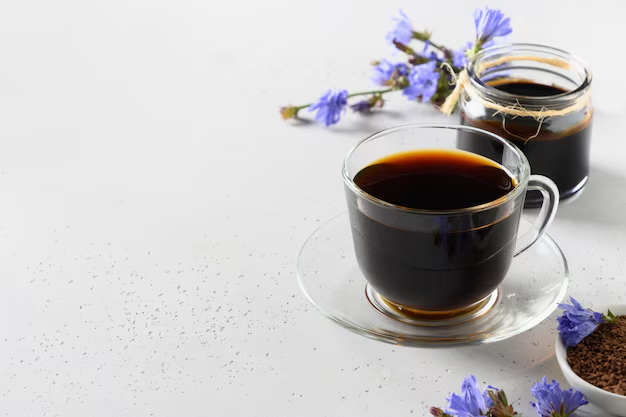
What It Is:
Chicory is a flowering plant that has become one of the most popular healthy coffee alternatives. Its roots are dried, roasted, ground, and brewed in a way that closely resembles traditional coffee preparation. The result is a rich, earthy drink that feels familiar to coffee lovers.
What makes chicory stand out is that it’s naturally caffeine-free. This makes it a great option for people who are sensitive to caffeine or looking to reduce their intake without giving up the comforting taste and experience of a warm beverage.
Many people enjoy chicory for its smooth flavor and gentle effect on the body. As one of the leading healthy coffee alternatives, it provides a satisfying experience without the jittery side effects. Whether enjoyed on its own or blended with other ingredients, chicory offers a nutritious and enjoyable way to start or wind down your day.
Benefits:
Rich in inulin, a type of prebiotic fiber that supports gut health.
Contains antioxidants.
May aid digestion and reduce inflammation.
Drawbacks:
May cause gas or bloating in sensitive individuals.
Not suitable for people with ragweed allergies.
Best For: Those looking for a caffeine-free or healthy coffee alternative with a coffee-like taste.
Matcha Green Tea
What It Is:
Matcha is a finely ground powder made from specially grown and processed green tea leaves. Unlike regular green tea, where the leaves are steeped and then discarded, matcha allows you to consume the whole leaf in powdered form, offering more concentrated nutrients.
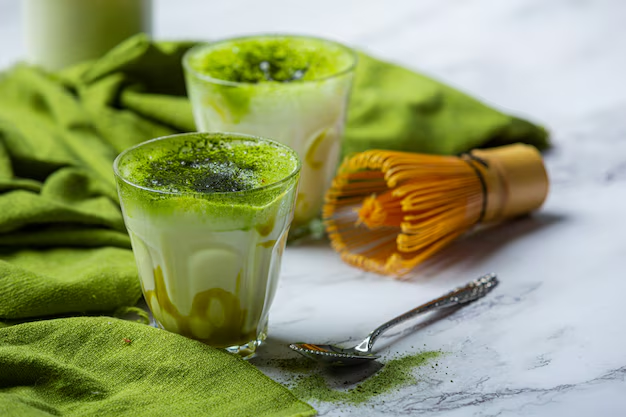
This makes matcha one of the most powerful healthy coffee alternatives. It contains a moderate amount of caffeine, but it also has L-theanine, an amino acid that promotes calm focus without the jittery feeling coffee can cause. This unique combination offers a smooth, sustained energy boost.
Matcha is also rich in antioxidants and supports overall wellness, making it a favorite among those seeking healthy coffee alternatives. Its vibrant green color and slightly sweet, earthy flavor make it enjoyable both hot and cold. Whether whisked into hot water or blended into smoothies, matcha is a delicious and energizing addition to your daily routine.
Benefits:
Contains a modest amount of caffeine (less than coffee).
High in antioxidants, especially catechins like EGCG.
Provides a calm, focused energy due to L-theanine, which balances caffeine’s effects.
May support metabolism and weight loss.
Drawbacks:
More expensive than most teas or coffees.
Taste can be grassy or bitter to some.
Best For: Those who want a balanced energy boost with antioxidant and cognitive benefits.
Golden Milk (Turmeric Latte)
What It Is:
Golden milk is a traditional Ayurvedic drink made by blending milk—either dairy or plant-based—with turmeric and warming spices like cinnamon, ginger, and black pepper. This comforting beverage has been used for centuries to support wellness and is now gaining popularity as one of the top healthy coffee alternatives.
The key ingredient, turmeric, is known for its anti-inflammatory and antioxidant properties. Combined with spices like ginger and cinnamon, golden milk helps support digestion, immunity, and overall health. It contains no caffeine, making it a gentle option for those avoiding stimulants.
As one of the best healthy coffee alternatives, golden milk offers a soothing, flavorful experience that can be enjoyed any time of day. It’s especially popular as a calming evening drink, helping to relax the body and mind. Warm and nourishing, golden milk is a delicious way to replace coffee with something healthier and more balanced.
Benefits:
Anti-inflammatory and antioxidant properties, thanks to curcumin in turmeric.
Calming and grounding—great for evening consumption.
Can support joint and immune health.
Drawbacks:
No caffeine, so it won’t provide an energy boost.
Requires preparation and isn’t as convenient as instant options.
Best For: People avoiding caffeine and seeking an anti-inflammatory, immune-boosting drink.
Yerba Mate
What It Is:
Yerba mate is a traditional South American herbal tea made from the dried leaves of the Ilex paraguariensis plant. It is often enjoyed socially and is known for its earthy flavor and energizing effects. Because it contains natural caffeine, yerba mate provides a boost similar to coffee.
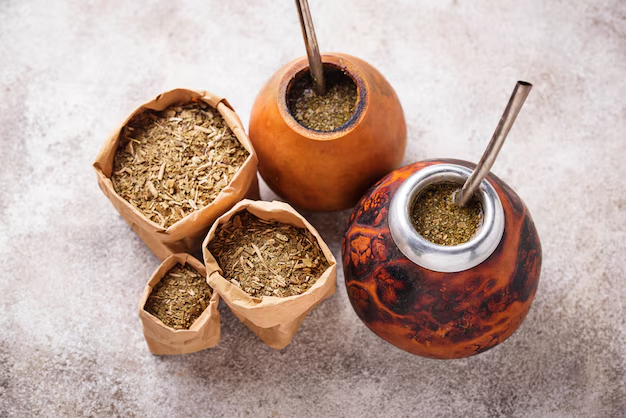
However, unlike coffee, yerba mate also contains antioxidants, vitamins, and minerals that support overall health. It offers a smoother energy lift without the jitters or crash, making it one of the more balanced healthy coffee alternatives. It can be enjoyed hot or cold, depending on preference.
As more people seek healthy coffee alternatives, yerba mate is gaining attention for its unique combination of stimulation and nourishment. Whether sipped from a traditional gourd or brewed in a tea bag, it offers a refreshing and healthy way to stay alert and energized throughout the day.
Benefits:
Provides a more balanced energy boost than coffee.
Contains polyphenols, xanthines, and saponins—compounds with antioxidant and anti-inflammatory properties.
Can improve mental focus and physical performance.
Drawbacks:
May cause similar side effects to coffee if consumed in excess.
Some studies have raised concerns about carcinogenic risks when consumed in very hot forms or in large amounts.
Best For: Those who want caffeine but prefer a gentler, more balanced stimulant.
Rooibos Tea
What It Is:
Rooibos is a naturally caffeine-free herbal tea that comes from the leaves of the Aspalathus linearis plant, which grows in South Africa. It has a mild, slightly sweet flavor and is often enjoyed on its own or with milk and sweeteners. Because it contains no caffeine, rooibos is a calming drink suitable for any time of day.
As one of the most gentle healthy coffee alternatives, rooibos offers a comforting experience without the stimulating effects of coffee. It’s rich in antioxidants and may support heart health, digestion, and overall well-being. Its smooth taste makes it a favorite for those looking to cut back on caffeine.
Rooibos is a great choice for people seeking healthy coffee alternatives that are both flavorful and soothing. Whether you enjoy it hot or iced, rooibos provides a satisfying, health-friendly option to replace your daily cup of coffee.
Benefits:
High in antioxidants, especially aspalathin and nothofagin.
May support heart health and reduce stress.
Gentle on the stomach and naturally sweet.
Drawbacks:
Doesn’t provide an energy boost.
Flavor is mild and may not satisfy those looking for a bold beverage.
Best For: Anyone seeking a caffeine-free, antioxidant-rich alternative for any time of day.
Dandelion Root Coffee
What It Is:
Roasted dandelion root is another great option among healthy coffee alternatives. Much like chicory root, it can be dried, roasted, and brewed to create a warm beverage with a deep, rich flavor that’s very similar to coffee. However, it’s completely caffeine-free, making it suitable for people looking to avoid stimulants.

Dandelion root is known for supporting liver function and digestion. It contains antioxidants and natural compounds that may help the body detox gently. Many people choose it not only for the taste but also for its health-boosting properties.
As one of the popular healthy coffee alternatives, roasted dandelion root provides a satisfying and earthy drink without the side effects of caffeine. Whether brewed alone or combined with other herbal ingredients, it’s a nourishing and flavorful substitute that fits easily into a healthy daily routine.
Benefits:
Supports liver health and digestion.
Naturally caffeine-free.
Contains vitamins A, C, and K, as well as minerals like potassium and iron.
Drawbacks:
Strong flavor may not appeal to everyone.
May have a diuretic effect.
Best For: People looking for a caffeine-free, detox-supportive beverage.
Lemon Water or Herbal Infusions
What It Is:
Warm lemon water or herbal teas like peppermint, ginger, or hibiscus offer a refreshing and energizing way to start your day. These drinks are naturally caffeine-free, making them great healthy coffee alternatives for those looking to avoid the stimulating effects of coffee while still boosting their energy.
Lemon water is known for its detoxifying properties and ability to support digestion. When paired with herbs like peppermint or ginger, it becomes a soothing drink that promotes both relaxation and alertness. Hibiscus, on the other hand, adds a tangy flavor and offers additional health benefits, such as supporting heart health.
For those seeking healthy coffee alternatives, this combination of warm herbal drinks can provide a nourishing start to the morning. Whether enjoyed alone or as part of a balanced routine, these beverages help hydrate, refresh, and set the tone for a productive day.
Benefits:
Hydrating and detoxifying.
May support digestion and skin health.
No caffeine or additives.
Drawbacks:
No stimulants, so it won’t replace the energy kick of coffee.
May be too light for those accustomed to robust flavors.
Best For: Morning hydration and gentle cleansing, especially for those weaning off caffeine.
Cacao-Based Drinks
What It Is:
Drinks made from raw cacao or unsweetened cocoa powder offer a delicious and nutritious alternative to coffee. These beverages can be prepared like hot chocolate but without the added sugar or dairy, making them a great option for those seeking healthy coffee alternatives.
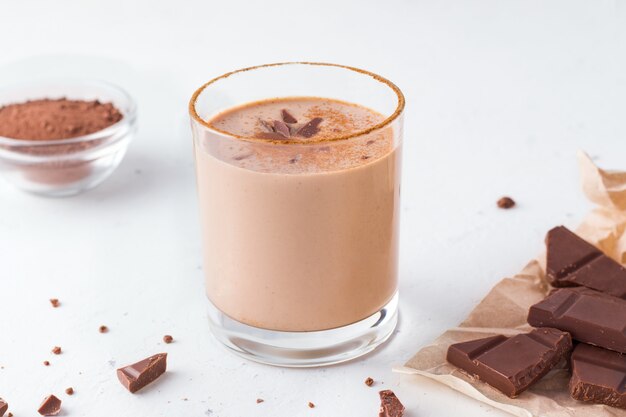
Raw cacao is packed with antioxidants and has natural mood-boosting properties, providing a gentle energy lift without the jitters commonly associated with caffeine. It also contains magnesium, which supports relaxation and overall wellness. By skipping sugar and dairy, you can enjoy the rich, chocolatey flavor without the extra calories.
For those looking to reduce caffeine intake, raw cacao drinks are a satisfying and health-conscious substitute. They can be enjoyed hot or cold and customized with different spices like cinnamon or vanilla. This healthy coffee alternative provides a flavorful, nourishing option for starting your day or enjoying a midday treat.
Benefits:
Contains theobromine, a mild stimulant.
Rich in magnesium, iron, and antioxidants.
May boost mood due to phenylethylamine (PEA) and serotonin precursors.
Drawbacks:
Still contains some stimulants and calories.
Unsweetened versions may be bitter.
Best For: Those seeking a mood-lifting, heart-healthy alternative with a rich, indulgent taste.
Adaptogenic Herbal Blends
What It Is:
Herbal teas or powders containing adaptogens like ashwagandha, reishi, maca, or rhodiola are excellent healthy coffee alternatives. These powerful herbs help the body adapt to stress, promoting balance and resilience. They are often used in wellness routines to support overall health and well-being.
Adaptogens are known for their ability to stabilize the body’s response to stress and improve energy levels without the crash associated with caffeine. Ashwagandha, for example, is popular for its calming effects, while reishi is often used for immune support. Maca and rhodiola can help enhance endurance and mental clarity.
Incorporating adaptogens into your routine can provide sustained energy and focus without relying on coffee. These healthy coffee alternatives offer natural ways to support both physical and mental health, making them a great choice for those looking for a calming yet energizing start to the day.
Benefits:
Can improve stress response, stamina, and focus.
Often caffeine-free or low in caffeine.
Support hormonal and adrenal health.
Drawbacks:
Can take weeks of consistent use to feel benefits.
Some adaptogens may not be suitable for everyone (e.g., pregnant women).
Best For: Those looking to manage stress, improve resilience, and find long-term energy solutions.
Tips for Transitioning Away from Coffee
Making a switch from coffee can be challenging, especially if you’re a long-time drinker. Here are some practical tips:
Gradual Reduction: Instead of quitting coffee cold turkey, start by replacing one cup a day with healthy coffee alternatives. This gradual reduction helps ease your body into the change, reducing the intensity of withdrawal symptoms like headaches and fatigue. Over time, you can slowly decrease your coffee intake while exploring other energizing drinks.
Stay Hydrated: Dehydration can worsen withdrawal symptoms such as headaches, irritability, and fatigue. Drinking plenty of water throughout the day can help minimize these symptoms and keep you feeling energized as you transition to healthy coffee alternatives.
Get Enough Sleep: Ensuring you’re well-rested during this transition is crucial. Lack of sleep can make the adjustment harder and increase your dependence on coffee. A good night’s sleep can help your body adapt more easily to your new routine with healthy coffee alternatives.
Supplement Smartly: Including supplements like magnesium, B vitamins, and adaptogens can help support your energy levels and manage stress during the transition. These nutrients work in harmony with healthy coffee alternatives to keep your body balanced and energized.
Experiment: Finding the right healthy coffee alternatives may take some trial and error. You might need to try different teas, herbal drinks, or even roasted root options like chicory or dandelion to discover which one you enjoy most and helps keep your energy up without the side effects of caffeine.
Conclusion

Coffee is a cherished part of many people’s morning routines, but it’s not the only way to boost energy and support overall health. Healthy coffee alternatives offer a variety of benefits, catering to different needs and preferences. From the deep, earthy taste of chicory root to the vibrant, antioxidant-packed power of matcha, there’s something for everyone.
In addition to these options, adaptogens like ashwagandha and rhodiola provide a calming, stress-relieving boost without the jitters that often come with caffeine. These healthy coffee alternatives are ideal for those looking for a more balanced, sustainable way to stay energized.
By exploring and incorporating these beverages into your routine, you can find options that align with your body’s needs, mood, and wellness goals. Whether you’re after relaxation or focus, healthy coffee alternatives offer a variety of choices to help you achieve long-term well-being.
FAQs
What are healthy coffee alternatives ?
Healthy coffee alternatives are drinks that provide energy or relaxation without relying on caffeine. These include herbal teas, adaptogenic beverages, matcha, chicory root, and other options that support health and well-being.
Can I replace coffee with herbal tea ?
Yes, herbal teas like chamomile, peppermint, and ginger are great caffeine-free alternatives that can provide various health benefits, such as supporting digestion or reducing stress.
How can I reduce my coffee intake ?
Start by gradually replacing one cup of coffee a day with a healthy coffee alternative, staying hydrated, ensuring you get enough sleep, and experimenting with different drinks until you find one you enjoy.
Are adaptogenic drinks good for replacing coffee ?
Adaptogenic drinks made with herbs like ashwagandha, maca, and rhodiola are excellent healthy coffee alternatives. They help the body manage stress, improve energy, and promote overall wellness without the side effects of caffeine.
What is matcha and how is it a healthy coffee alternative ?
Matcha is powdered green tea that provides a gentle energy boost along with antioxidants. It’s a great healthy coffee alternative because it offers sustained energy without the jitters or crashes commonly associated with coffee.


